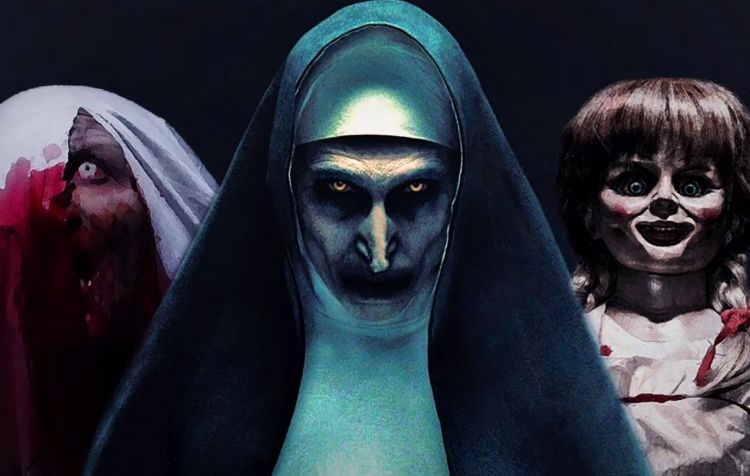Highest rated horror movies Coming up with a list of the best horror movies of all time is a good way to weed out the scary movie veterans from the scaredy cats. You can spot 'em every time a jump scare happens, or a devil-possessed girl crab walks upstairs, or an alien missiles out of some poor sucker's chest.
1. THE EXORCIST

You may not agree that The Exorcist is the scariest movie ever, but it probably also isn’t much of a surprise to see it at the top of our list — with a whopping 19% of all the votes cast. William Friedkin’s adaptation of the eponymous novel about a demon-possessed child and the attempts to banish said demon became the highest-grossing R-rated horror film ever and the first to be nominated for Best Picture at the Oscars (it earned nine other nominations and took home two trophies). But outside of its critical and commercial bona fides, the film is well-known for the mass hysteria it inspired across the country, from protests over its controversial subject matter to widespread reports of nausea and fainting in the audience. Its dramatic pacing and somewhat dated effects may seem quaint compared to some contemporary horror, but there’s no denying the power the film continues to have over those who see it for the first time.
2.HEREDITARY

Writer-director Ari Aster made a huge splash with his feature directorial debut, a dark family drama about the nature of grief couched within a supernatural horror film. Toni Collette earned a spot in the pantheon of great Oscar snubs with her slowly-ratcheted-up-to-11 performance as bedeviled mother Annie, but the movie’s biggest shock came courtesy of… Well, we won’t spoil that here. Suffice it to say Hereditary struck such a nerve with moviegoers that it instantly turned Aster into a director to watch and shot up to second place on our list.
3.THE BLAIR WITCH PROJECT

The movie that gave birth to the widespread "horror movie as faux-documentary" trend and that inspired such films as Paranormal Activity, The Blair Witch Project is quite an effective scare fest in retrospect.
Some of its then-inspired choices in the realm of "is it or isn't real" seem dated and obvious now, given the fact that the Internet seemingly sets out to reveal spoilers that surround projects like this. (Also, we know it's all fiction at this point.) But Blair Witch came out in 1999, when the Internet was in its infancy and could be used as a tool to successfully convince audiences that maybe the story of a three-person documentary crew going snipe hunting for what turns out to be pure evil is in fact real.
Blame the gift/curse of the shaky cam on this movie, but give it credit for delivering scares in such a way that changed the way we like to be scared... and that changed the way Hollywood goes about making the things that scare us.
4.THE CONJURING

James Wan has staked out a place among the modern masters of horror, directing films like Saw, Dead Silence, Insidious, and this inspired-by-true-events chiller based on the experiences of real-life paranormal investigators Ed and Lorraine Warren. The Warrens, best known for their work on the strange case that inspired the Amityville Horror movies (which played a part in The Conjuring 2), were portrayed by Patrick Wilson and Vera Farmiga, who grounded the effective jump scares and freak-out moments with a believable world-weariness. Together, Wan and his co-leads found fresh terror in familiar genre tropes, and the end result is a sprawling cinematic universe that only continues to grow.
5.28 DAYS LATER

The zombie genre is bigger than ever now, and you have 28 Days Later to thank for it. The genre was practically dead by the time Danny Boyle and screenwriter Alex Garland gave zombies a much needed shot of adrenaline with this film. Seriously, this movie is pumped up on adrenaline. The zombies -- er, sorry, “infected” -- sprint through the movie, spawning endless debates about whether “fast zombies” are scarier than “slow zombies.” As if that’s the important thing.
What mattered most is that 28 Days Later was more than a visceral horror experience. A great cast and a smart script treated the concept with sincerity and severity, and Boyle’s digital cinematography gave the film an immediacy that hadn’t been matched at that time. If zombies -- sigh, “infected” -- did take over the Earth, this is surely what it would look and feel like. And it would be terrifying.
6.LET THE RIGHT ONE IN

Can you believe that there's a movie on our list that got its title from a Morrissey song? This most unusual of love stories is a Swedish film which hit it big internationally with its tale of a 12-year-old boy and his centuries-old vampire... who looks like a 12-year-old girl (but most certainly isn't).
Whether or not Oskar and Eli's relationship is an equal partnership, or Oskar is doomed to become the vampire's next Hakan (the old and ill-fated human who takes care of Eli early in the film) isn't clear. But it's an engrossing story from start to finish.
Though chock-full of bloody good horror moments, director Tomas Alfredson's film works so well because it is acutely interested in its two lead characters: Oskar, the boy who is bullied at school and finds a protector in his new, nocturnal neighbor; and Eli, a beautiful little cherub who's actually not even a girl and certainly not a cherub. Weird, right? But so good.
7.DAWN OF THE DEAD

George Romero practically created the zombie movie genre single-handedly in 1968 with Night of the Living Dead. Ten years later he refined the formula with Dawn of the Dead. Far bigger, gorier, and funnier than its predecessor, Dawn of the Dead remains Romero's definitive work.
Whereas Night featured a small cast of survivors holed up in a remote farmhouse, Dawn opens with a glimpse of a major metropolitan area falling to chaos during the zombie outbreak. It isn't long before our four heroes are forced to leave town and barricade themselves inside a shopping mall. But as it turns out, the undead hordes still retain enough of their old selves to feel the need to shop and consume.
The true brilliance of Dawn is how it combined straight-up zombie carnage with a healthy dose of satire and social commentary. At the end of the day, are modern Americans really so different from the shambling undead? They crave warm flesh; we crave iPhones.
8.THE RING

It’s always a tricky proposition to take something that works well for one culture and try to translate that formula successfully for another, but Gore Verbinski managed that with The Ring. A remake of Japanese director Hideo Nakata’s acclaimed thriller about a cursed videotape, Verbinski’s take kept the original film’s striking visual imagery — the ghost of a young girl in a white dress with long black hair covering her face — and found that it scared the hell out of audiences no matter where they were from. While the film wasn’t as well-regarded as its predecessor, it features a committed performance from a then up-and-coming Naomi Watts, and for many, it served as an introduction to East Asian horror cinema.
9.INSIDIOUS

James Wan has already appeared higher on this list, but before he and Patrick Wilson made The Conjuring, they worked together on this supernatural thriller about a young boy who falls into a coma and begins to channel a malevolent spirit. The bare bones of the story weren’t the most groundbreaking, but frequent Wan collaborator Leigh Whannell infused it with a compelling enough mythology that it spawned four more installments. Wan also stated that Insidious was meant to be something of a corrective to the outright violence of Saw, which compelled him to craft something on a more spiritual level, and the end result is an effective chiller featuring what is frequently regarded as one of the best jump scares ever put on screen.
10.IT

The fear of clowns is a very real thing, even if it’s become so commonplace to announce it that it feels disingenuous. If you needed any further evidence, we direct you to the box office haul of 2017’s IT, based on the Stephen King novel of the same name, which went on to beat The Exorcist’s 44-year record as the highest-grossing horror film ever. Oh, and of course, its 10th-place finish on this list. Andy Muschietti’s big-budget adaptation drew on nostalgia to tell its story of children scarred by trauma, while Bill Skarsgard’s take on Pennywise the evil, shapeshifting clown was bizarre and unsettling in all the right ways. Add a healthy dose of jump scares, a handful of impressive set pieces, and some top-notch CGI, and you’ve got a recipe for a horror film that’s both fun and full of scares.
Also Read: Top 10 Cartoons in India























